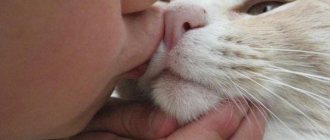No matter what psychologists, behaviorists, veterinarians and crazy cat owners try to tell you, there is one simple, unchanging truth about cats: they are weird. Okay, they're also soft and fluffy, but mostly they're just weird.
Just when you finally think you understand your cat, she suddenly attacks your ankles or decides that the cat food you've been buying for the last six years is suddenly no longer good enough and you just need to take all 36 cans feed that you bought three days ago and exchange it for something else.
We want to help you understand why cats behave the way they do and how to deal with it. Read on to find out how to make your relationship with your cat perfect for both of you.
Purrs and then bites your hand: why do cats suddenly bite when you pet them?
But why do cats react this way? How to stop this?
You should know that your pet does not need too much affection.
If people and cats can live together, it is because we make concessions to them... and they tolerate us in their environment! Cats are free-spirited beings, right? For example, if you sleep with your pet, then she takes up too much space compared to her size.
When we pet our cat, it happens that she bites for no apparent reason.
However, you can anticipate such a reaction thanks to several signals that your furry one sends you.
When a cat begins to cuddle up to the person who is petting it, it means that it wants to be hugged more.
On the other hand, when she believes that she has already received her quota of necessary affection, she conveys some messages, subtle or not, so that the stroking will stop.
The cat begins to cautiously wag its tail, pin its ears back, lick human fingers or dilate its pupils... These are warnings for us to leave it alone.
Too much petting can excite a cat and explain its "violent" behavior. She stops experiencing pleasure from receiving caresses, and the hands that touch her begin to give her an extremely unpleasant sensation.
How to react?
If you have this problem, here's what to do.
First, as mentioned above, it is important to understand and analyze the cat's actions. If she bites, you must be stern, put the animal on the floor and firmly say “no”, and then ignore him.
There is no point in scolding your cat or being aggressive because she won't understand it. Remember also that it is not her fault; she did everything to make it clear to you that she had enough!
But if your cat exhibits aggressive behavior when you pet it in a certain area, it may be because it feels intense pain there. In this case, it is better to consult a veterinarian.
So! Living together with cats requires a compromise, and in a human-cat duo, people must adapt as much as possible! Then your love will be mutual.
Some people believe that cats rarely or almost never bite, but everyone who has pets says the opposite. Often with this behavior they try to tell their owner something, for example, “I don’t like this.” They have thin and sharp teeth, their bites are often painful and do not heal well, and can become infected.
Norm or pathology
Sometimes some cats develop mental disorders, but this cannot be detected on their own. For this purpose, it is worth visiting a veterinarian and telling your concerns about changes in the animal’s behavior and the appearance of unmotivated aggression. Only a specialist will be able to determine whether this is related to pathology or is a character trait.
But most often bites are caused by other reasons. Cats are one of the most independent pets and this needs to be taken into account. And everyone's character is different. While some are very affectionate and love attention from their owner, others don’t like it.
Some animals, even living for a long time in a family, try to keep a distance from people and cannot stand a familiar attitude towards their person. These are already individual character traits and it will not be possible to change temperament.
Reasons for unexpected aggression
Cats can bite in different ways. There are two options for this behavior:
- The rarest one is when the pet gently bites its fingers, while the claws are removed and its actions are more pleasant than not. This is what they do most often when communicating with their offspring. When a cat behaves like this with its owner, it means it trusts him and loves him very much.
- More common is a sudden change in behavior. A second ago, the pet took the stroking absolutely calmly, showing no signs of aggression, but now it turned over and began to painfully bite and scratch the hand.
It is important to understand the reasons that motivate cats to bite and scratch their owner's hands. Among the most common are:
Aggression
Often a sign of problems with the pet's socialization. Breeders try to accustom a kitten to stroking in early childhood - up to 7 weeks of age. If this is not done, then in adulthood such an animal will shy away from affection from its owners and bite.
Pain
It is important to remember that cats, like people, are not always healthy; they have stomach, back, head, joint pain, and may have skin problems. Therefore, when showing affection, when something is not right with their health, they can bite. By this they are trying to tell the owner to leave them alone.
If behavior that is not typical appears, you should contact a veterinary clinic for examination, as this may be an indirect sign of illness.
Static electricity
Often, if the animal's fur is too dry and the air humidity is high, microdischarges may form when stroking. A person may not notice this, but it is extremely unpleasant for a pet, so he may bite.
Pet gender
This factor also needs to be taken into account. Many cats are more affectionate, but can be aggressive once they become mothers. Cats are often independent and do not like excessive affection, with the exception of castrated individuals; they begin to show more attention to the owner and demand the same from him.
Increased attention from a person
It must be remembered that these are independent animals that do not like being forced on them. The exception is Oriental cat breeds. Such pets are extremely sociable and loving. But they can also be in a bad mood when affection does not bring pleasure.
Dream
Some cats fall asleep during stroking and, if the rhythm or pressure changes, they may wake up and bite. This behavior is common among poorly socialized pets who always expect trickery from people. Or another situation - the animal is sleeping so soundly that stroking came as a surprise and frightened it. In this case, it is simply a defensive reaction against fear.
Dominant behavior
The cat thus tries to establish himself and show that he is the boss in the house. He tries to control the process of affection on the part of the owner.
Negative experiences in the past
Often people pet their pets before unpleasant procedures, such as nail trimming or bathing. But for them the model is fixed: if they stroked it, something unpleasant happened. And subsequent displays of affection on the part of the owner will provoke biting and scratching.
Early weaning
Cats teach their offspring that a person is a friend, he feeds, caresses and does not cause pain. If you take the kittens away from her too early, they won't recognize it and may perceive people negatively. Pets raised on the street also display a similar pattern of behavior. Cats do not know that their owners are trying to show their love and care in this way, but consider affection a threat to themselves.
Feeding kittens and pregnancy
During this period, some cats may experience a change in character, and in this way they try to protect their offspring and protect them.
What can influence a pet's character?
Some physiological and psychological aspects can also affect the character of cats, changing their behavior and attitude towards the owner and his affection. Unexpected aggression, manifested for no apparent reason, can be provoked by:
- Puberty period. At this time, young cats behave like teenagers - aggressively, demonstratively. This is explained by hormonal surges and the emergence of new physiological needs. The solution here would be to find a mate for the pet or castration.
- Declawing is a major stressor for your pet. Feeling vulnerable and defenseless, a cat may try to defend itself with its teeth, even without visible potential danger.
- Lack of attention and care. Lack of communication and poor living conditions do not have the best effect on the psychological state of a pet. Therefore, it is worth finding about 15-20 minutes every day to play with your pet.
- Changing baby teeth to molars is accompanied by itching and unpleasant sensations in the gum area in kittens, which they try to eliminate with bites. Providing your pet with special toys designed for these purposes will help solve the issue.
Only by finding out the reasons for the strange behavior of your furry pet can you find the right options for its correction.
- how to trim a cat's claws;
- how to train a cat to use a scratching post.
Cat behavior patterns
Experts have identified several behavioral patterns in cats when they can bite people:
A game
It's always aggression, but like studying or training. The objects are models (rubber ball, artificial mouse, rattle on a string, etc.). For kittens, this is training, learning to hunt, which is certainly accompanied by bites. Therefore, you should not play with your hands or feet with your pets, as they begin to be perceived as a “victim” that needs to be caught and neutralized. When playing with children, at first this behavior is amusing, but this pattern of play will become ingrained in him and in adulthood it will be difficult to wean him off this pattern.
You need to entertain your pets only with the help of special devices for cats.
Host - food
People are a source of food for their pets, so you shouldn’t tease them with food or treats, much less leave it all in a visible place. By biting and scratching, cats try to get their owners to give them another portion of goodies.
Licking the owner's hand - biting
Often people who keep a cat at home are surprised by this pattern: the pet was just purring and licking its fingers and suddenly bit. There may be several reasons for this behavior. For example, unrealized maternal instinct. When licking their offspring, cats may bite. Or it could be a sudden change in the animal's mood. Thus, the pet wants to say that he is tired of affection and needs to be left alone. To prevent such incidents, it is important to pay attention to the cat’s body language and notice changes in his mood. Thus, twitching of the tail and skin on the back, billowing fur indicate an imminent attack on the owner’s hand.
Resentment
For the most part, cats are not vindictive and do not hold grudges for long. But when the owner does not allow them to play with some object or does not allow them into a certain room, they can get angry and show their dissatisfaction with this by biting. With this behavior, you need to try to switch the pet’s attention to another thing, try to distract it with a game.
Secondary aggression
Cats are very addicting creatures and often after an interesting game with an artificial mouse, the owner, wanting to pet the pet, gets hit on the hand with a clawed paw. This happens because the animal has not calmed down and is still in the process of playing for a little while.
The recipe for this behavior is simple - let the cat calm down a little, and after time has passed, pet it.
Primary aggression
Often, in response to physical punishment, the pet begins to show hostility towards the owner. This is due to the fact that he adopts a human behavior model and enters into a kind of fight. It is important to remember that physical punishment is not the best way to raise cats and should not be used. You should scare him with a loud sound or sprinkle water to stop the attack. Sometimes primary aggression indicates an illness in the pet, so if all other reasons for this behavior are excluded, but if the cat continues to rush at people, you need to take him to a veterinarian for examination.
The meaning of the cat's actions. Translation from cat language to human
If an animal bites or scratches you, it means that the animal is attached to you.
Gentle purring with squinting eyes, always only for the owner.
If a cat rolls from side to side and shows his belly, then he trusts you recklessly.
If a cat butts and pushes with its head, this expresses love for the person.
Trampling with paws on the owner’s body is complete trust.
Gifts brought for you: a strangled mouse or a caught bird - the cat adores you and is ready to give you everything.
If the cat lies down on its lap, the animal loves and trusts the person.
A long, squinting cat gaze can be interpreted as a declaration of love.
Presents his fluffy butt to the owner - demonstrates love and trust. (Kittens always turn their backs to their mother when they meet).
Meows at you - wants to talk or asks for food. A fluffy tail raised up is a joy from meeting you.
Biting hands - adoration. Cats mark things, sharpen their claws on furniture and wallpaper - they are comfortable and safe in the house. It is useless to scold or punish a cat for this, he does not understand why he is being scolded, he needs to be weaned differently.
Why does a cat bite just like that?
For the most part, cats never bite for no reason, but there are situations when people feel as if they are being attacked for no reason. However, this is not the case and there are several factors influencing this behavior, in addition to those described above. These include:
- Changing teeth. Animals, like humans, first grow baby teeth, which are subsequently replaced by permanent teeth. In cats, this period begins at 3-4 months of age. In this case, there may be pain and discomfort in the oral cavity, and they begin to actively bite the owner’s hands. It is important to prevent the pattern of such behavior from becoming established at this point. Otherwise, even an adult animal will continue to gnaw people’s fingers. You need to buy special rubber toys that your pet will scratch his teeth on.
- Sexual desire. During this period, many cats become aggressive. This is easy to notice: they leave marks on the territory of the apartment, scream heart-rendingly and ask to go outside. There are two options for solving the problem: castration and selection of a partner.
- Declaw removal. Currently, this inhumane operation is common in veterinary practice. If after it the pet begins to bite, this indicates either revenge, or that his teeth are the only weapon with which he can stand up for himself and this is what the cat uses.
- Lack of attention from people. If the pet is not played with and petted a lot, a bite is its way to interest the owner. You should devote at least 10 minutes a day to communicate with your pet, and the problem will disappear.
- Lack of care. If the tray is not cleaned or there is a lack of food, the cat tries to let the owner know that it is time to clean up his toilet or feed him.
How to recognize readiness for an attack
Cats do not bite without warning; it is important to pay attention to the signs before attacking. These include:
- the animal's posture changes;
- the pet’s body tenses, which can be felt when touched;
- the purring suddenly stops;
- ears flatten;
- anger in the gaze, pupils dilate;
- the nature of the sounds produced becomes threatening, for example, rumbling, purring;
- the expression of the muzzle changes from peaceful to angry;
- the tail begins to twitch.
One or a combination of signs indicate that the pet is aggressive, that it has begun to get angry and that it will soon attack a person. You should not ignore them, but it is better to leave the cat alone for a while so that he calms down.
How to stop a cat from biting
There are several techniques that can be used to rid your pet of a bad habit and prevent it from developing. These include:
- Proper communication with guests. A kitten should not perceive people as aggressors, so it is worth accustoming it to them from a young age. But it is also important that those who come behave with respect for the pet: do not pick him up if he does not like it, do not throw him up (he may get scared) and do not bother him too much. If an animal has huddled in a corner in front of guests, there is no need to drag it out of its shelter to show off to your friends.
- Your pet should have toys with which he can have fun, but should not play with his hands.
- If a cat bites, you should make a sharp sound and he will let go, as it is unpleasant for him. For example, clap your hands or shout sharply.
- If episodes of aggression have become frequent, and all familiar causes of such behavior have been ruled out, it is worth visiting a veterinarian; the problem may be a pet illness.
- After the bite, show the cat that it is unpleasant. You can ignore requests for a treat or to continue playing.
- It is important for the owner to determine the approximate time during which the pet allows stroking and not to neglect this knowledge.
- In case of frequent bites, you can prepare a container with a spray bottle and spray it on the cat in case of aggression. He will get scared and run away. This will wean him from such behavior.
- Get vaccinated against rabies regularly. Your pet can become infected with this incurable disease and become dangerous to others. Therefore, you should not neglect regular visits to the veterinary clinic.
Diseases
Why cats rush to their feet in order to bite becomes clear when it comes to the health of the pet. This is the worst case scenario when the cause of this behavior is a disease of the cat's brain, such as a tumor.
This type of pet health problem can turn the sweetest little kitten into a crazy beast. Aggression caused by illness does not appear suddenly. Changes occur slowly as the disease progresses.
Not only brain diseases can negatively affect a cat’s behavior. Other diseases also have similar effects. Especially those for whom it is long and debilitating.
When sick, a cat may experience discomfort and show aggression. The best solution in this case is to visit a veterinarian, make an accurate diagnosis and timely treatment.
Health conditions may cause aggressive behavior in your pet
What to do if kittens bite: parenting recommendations
Kittens, like children, need to be raised, only this is done differently. It is important to remember that the sooner you start this process, the more effective it will be.
It is more difficult to retrain an adult animal than a baby. If he bites hard, you need to stop playing and clearly, loudly say “No” and stop interacting with him, ignore him for a while. You can hiss at him after a bite. Another option is possible - to switch attention to something else, for example, a toy, but you cannot give a treat. Otherwise, he will take this as praise and will continue to behave aggressively towards people.
It is important for the owner to pay attention to the pet’s character and favorite places for petting. So, some cats like to be stroked on their bellies, while others categorically cannot stand it and allow themselves to be touched only on their backs.
In any case, it is necessary to find out the cause of aggressive behavior and eliminate the factors leading to it. If you can’t cope on your own, you can seek help from specialists.
Playful attitude
One of the main reasons why a cat bites their feet is boredom. The owner should not forget to diversify the animal’s environment, give it a toy, play together and carefully hide objects that it is not desirable for the pet to become an object of interest to.
A cat may have dozens of toys, but too many can become boring. Therefore, you should hide some of them, and display only part of them, and after a while change their places. In this case, the cat will treat the previously hidden toys as a completely new object and will again show interest in the object.
When a cat jumps up to bite, the owner can throw him special toys, previously frozen in the refrigerator, or ice cubes. Biting such cold materials will calm the cat.
Attention! This method is especially applicable for small kittens whose teeth itch. After all, by biting the owner’s legs, they try to soothe pain in the game.
Leg biting is a way to attract the owner's attention when the cat wants to play. You should pay more attention to your pet, play with it more often, then the problem will be solved.
A playful attitude is a popular reason for biting the owner's feet.











